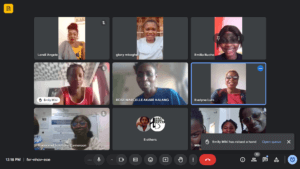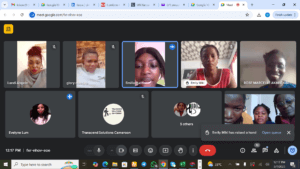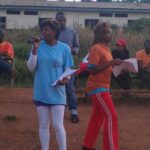In a collaborative effort to commemorate International Women’s Day 2025, the HEDECS Cameroon in partnership with the Women for Gender Taskforce, successfully organized a virtual event centered around the theme “Accelerating Action for All Women and Girls: Rights, Equality, and Empowerment in the Face of Gender Backlash.” The event brought together a diverse group of participants, including women’s rights advocates, community leaders, and representatives from various Civil Society Organizations (CSOs).
The event featured insightful discussions and presentations, with a focus on the pervasive issue of gender backlash and its impact on the rights, equality, empowerment and health of women and girls. The keynote address was delivered by HEDECS Cameroon, who shared their expertise on the subject and outlined strategies for women-led CSOs to effectively participate in mitigating the negative impact of gender backlash.
Key Discussion Points
Understanding Gender Backlash: Participants delved into the concept of gender backlash, recognizing it as a counter-movement that seeks to undermine the gains made in gender equality. The discussions highlighted how this phenomenon manifests in various forms, including political resistance, reproductive challenges, gender-based violence, and economic barriers, thereby hindering progress towards gender equality.
The Role of Women-Led CSOs: A significant portion of the event was dedicated to exploring the pivotal role women-led CSOs can play in combating gender backlash. Participants emphasized the importance of strengthening collaboration among these organizations to amplify their collective voice and drive systemic change. The need to invest in education and awareness campaigns to promote gender-equitable norms was also underscored.
Data-Driven Advocacy: The event showcased the power of data-driven advocacy in addressing gender backlash. HEDECS’s Gender Community-Led Monitoring (CLM) project was presented as a tool for change, empowering women to engage in community monitoring to generate evidence and influence change to improve the availability, accessibility, acceptability and quality of the gender and health services. Participants were encouraged to utilize data to inform advocacy efforts and hold stakeholders accountable for their commitments to gender equality.
Strategies for Participation: Women-led CSOs were urged to actively participate in mitigating gender backlash by adopting various strategies, including:
- Building strong partnerships to amplify their collective voice.
- Educating communities about the harmful impacts of gender backlash.
- Utilizing data to inform advocacy efforts and drive policy changes.
- Creating platforms for women to share their experiences and advocate for their rights.
Conclusion
The virtual event served as a platform for participants to reaffirm their commitment to advancing gender equality and empowering women and girls. It underscored the importance of collaborative efforts in addressing the complex issue of gender backlash and highlighted the crucial role of women-led CSOs in driving positive change. The insights shared and strategies discussed during the event are expected to inspire and guide future initiatives aimed at accelerating action for all women and girls, ensuring their rights, equality, and empowerment in the face of gender backlash.

Written by: Epan Melvis



